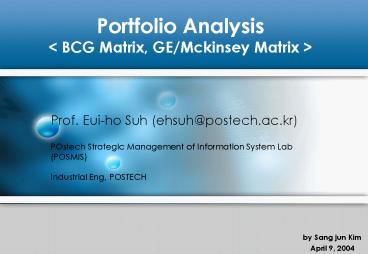Portfolio Analysis < BCG Matrix, GE/Mckinsey Matrix > PowerPoint PPT Presentation
1 / 9
Title: Portfolio Analysis < BCG Matrix, GE/Mckinsey Matrix >
1
Portfolio Analysislt BCG Matrix, GE/Mckinsey
Matrix gt
Prof. Eui-ho Suh (ehsuh_at_postech.ac.kr) POstech
Strategic Management of Information System Lab
(POSMIS) Industrial Eng, POSTECH
- by Sang jun Kim
- April 9, 2004
2
Contents
Portfolio Analysis
BCG Matrix
GE/Mckinsey Matrix
Advantages and Limitation of Portfolio analysis
3
1. Portfolio Analysis
- What is the Business Portfolio ?
- A business portfolio is the collection of
Strategic Business Units that make up a - corporation.
- The optimal business portfolio is one that fits
perfectly to the company's strengths and - helps to exploit the most attractive
industries or markets
- The aim of a portfolio analysis
- Analyze its current business portfolio and
decide which SBU's should receive more or less - investment
- Develop growth strategies for adding new
products and businesses to the portfolio - Decide which businesses or products should no
longer be retained - The BCG Matrix is the best-known portfolio
planning framework. And the GE / McKinsey - Matrix is a later and more advanced form of
the BCG Matrix
4
2. BCG Matrix (1/3)
- Stars (high growth, high market share)
- - use large amounts of cash and are leaders
in - the business so they should also generate
large - amounts of cash.
- Cash Cows (low growth, high market share) -
profits and cash generation should be high, and - because of the low growth, investments
needed should - be low. Keep profits high
- Dogs (low growth, low market share) - avoid
and minimize the number of dogs in a company.
- deliver cash, otherwise liquidate - Question Marks ( high growth, low market share)
- - have the worst cash characteristics of all,
because high - demands and low returns due to low market
share - either invest heavily or sell off or
invest nothing and - generate whatever cash it can. Increase
market share or - deliver cash
5
2. BCG Matrix (2/3)
- Limitations of BCG Matrix
- The link between market share and profitability
is questionable since increasing - market share can be very expensive
- The approach may overemphasize high growth,
since it ignores the potential of - declining markets
- The model considers market growth rate to be a
given. In practice the firm may be - able to grow the market
6
3. GE/Mckinsey Matrix (1/3)
- the GE/Mckinsey matrix attempt to
- improve upon the BCG Matrix
- Market (Industry) attractiveness replaces
- market growth as the dimension of industry
- attractiveness.
- Competitive strength replaces market share as
the - dimension by which the competitive position of
- each SBU is assessed.
- GE / McKinsey Matrix works with a 3 x 3 grid,
while - the BCG Matrix has only 2 x 2. This also
allows for - more sophistication
7
3. GE/Mckinsey Matrix (2/3)
Market Attractiveness - Market size- Market
growth rate- Pricing trends - Competitive
intensity / rivalry - Overall risk of returns in
the industry - Demand variability- Segmentation
Competitive Strength - Strength of assets and
competencies- Relative brand strength- Market
share - Market share growth- Customer loyalty-
Record of technological or other innovation
- Strategic Business Units are portrayed as a
circle plotted in the GE McKinsey Matrix - The size of the circles represent the Market
Size - The size of the pies represent the Market Share
of the SBU's - Arrows represent the direction and the movement
of the SBU's in the future
8
3. GE/Mckinsey Matrix (3/3)
- Limitations of GE/Mckinsey Matrix
- Core competencies are not represented
- Interactions between Strategic Business Units
are not considered
9
4. Advantages and limitation of Portfolio analysis
- Portfolio offers certain advantages
- It encourages top management to evaluate each of
the corporations businesses - individually and to set objectives and
allocate resources for each - It stimulates the use of externally oriented
data to supplement managements judgment - It raises the issue of cash flow availability
for use in expansion and growth - Its graphic depiction facilitates communication
- Portfolio have some very real limitations Matrix
- It is not easy to define market segments
- It suggests the use of standard strategies that
can miss opportunities or be impractical - It provides an illusion of scientific rigor when
in reality positions are based on subjective - judgments
- It is not always clear what makes an industry
attractive or what stage a product is at in - its lifecycle

